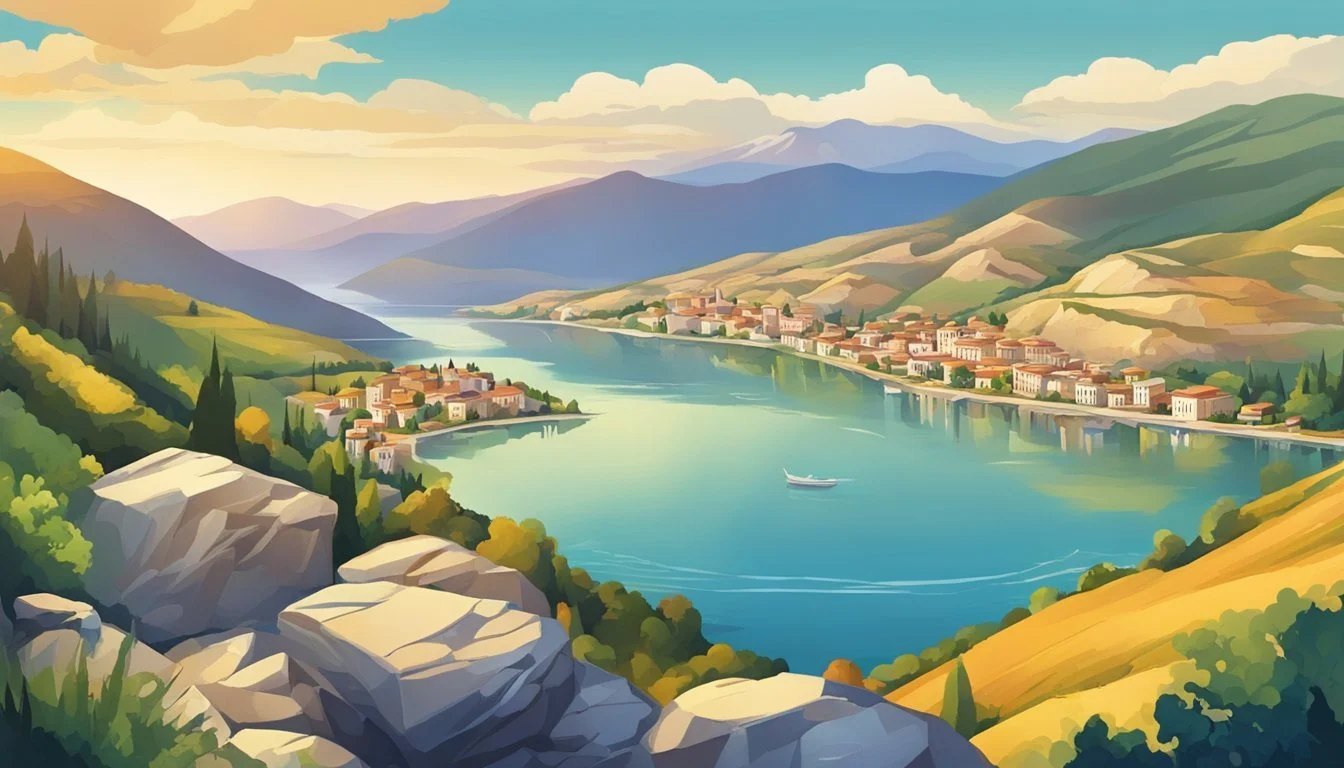7 Eye-Opening Documentaries on Macedonia
Unveiling the Hidden Gems of Southeast Europe
Documentaries offer a unique window into the complexities of different cultures and societies. Macedonia, a country with a rich history and diverse population, has been the subject of several compelling documentary films in recent years. These productions provide illuminating perspectives on the nation's traditions, challenges, and transformations.
From beekeeping practices to political tensions, Macedonian documentaries cover a wide range of topics that shed light on the country's past and present. These films not only educate viewers about Macedonia's unique cultural landscape but also explore universal themes that resonate across borders. By showcasing authentic stories and real-life characters, these documentaries invite audiences to gain a deeper understanding of this Balkan nation.
1) Honeyland
Honeyland is a compelling 2019 Macedonian documentary directed by Tamara Kotevska and Ljubomir Stefanov. The film offers a captivating glimpse into the life of Hatidže Muratova, a traditional beekeeper in a remote Macedonian village.
The documentary showcases Muratova's sustainable beekeeping practices, which have been passed down through generations. Her philosophy of taking only half the honey and leaving the rest for the bees exemplifies a harmonious relationship with nature.
Honeyland's narrative takes an intriguing turn when new neighbors arrive, disrupting the delicate balance of Muratova's world. This conflict highlights broader themes of environmental stewardship and the challenges faced by traditional ways of life.
The film's stunning visuals capture the rugged beauty of Macedonia's mountainous landscapes. Its intimate portrayal of Muratova's daily life provides viewers with a unique window into a rarely seen corner of the world.
Honeyland garnered significant critical acclaim, earning nominations in both the documentary and international feature film categories at the Academy Awards. This recognition underscores the film's universal appeal and its ability to resonate with audiences worldwide.
2) Macedonia: A Nation at a Crossroads
"Macedonia: A Nation at a Crossroads" explores the complex geopolitical landscape of this Balkan country. The documentary examines Macedonia's historical, cultural, and political challenges as it navigates its post-Yugoslav identity.
Viewers gain insight into Macedonia's economic struggles and efforts to modernize. The film highlights the nation's strategic position in southeastern Europe and its aspirations for European Union membership.
The documentary addresses the sensitive issue of Macedonia's name dispute with Greece. It explores how this conflict has impacted the country's international relations and development.
Interviews with Macedonian citizens, politicians, and experts provide diverse perspectives on the nation's future. The film examines the delicate balance between preserving cultural heritage and embracing modernization.
"Macedonia: A Nation at a Crossroads" offers a nuanced look at the country's ethnic diversity. It discusses the challenges of maintaining harmony between Macedonian and Albanian communities.
The documentary also touches on Macedonia's relationships with neighboring countries. It examines how regional dynamics influence the nation's political and economic decisions.
3) Whose is this Song?
"Whose is this Song?" is a thought-provoking documentary directed by Bulgarian filmmaker Adela Peeva. The film explores the complex cultural tapestry of the Balkans through the lens of a single melody.
Peeva's journey takes her across Turkey, Greece, Macedonia, Albania, Bosnia, Serbia, and Bulgaria. In each country, she encounters people who claim the song as their own, with passionate arguments for its origins.
The documentary reveals how the same tune can manifest in different forms. It appears as a love song, a religious hymn, and even as a battle cry, depending on the cultural context.
Peeva's investigation is marked by moments of humor, suspense, and surprising revelations. The film showcases the shared musical heritage of the region while highlighting the fierce national pride associated with cultural artifacts.
"Whose is this Song?" offers a unique perspective on Balkan history and identity. It demonstrates how a simple melody can become a symbol of national belonging and a source of contention between neighboring countries.
Through its exploration of this musical mystery, the documentary provides insights into the complex relationships between Balkan nations. It showcases both the connections and divisions that characterize this diverse region.
4) Balkan Rhapsodies: 78 Measures of War
Balkan Rhapsodies: 78 Measures of War is a documentary film directed by Jeff Daniel Silva in 2007. The film explores the aftermath of the Kosovo War and NATO bombing of Serbia in 1999.
Silva's documentary takes viewers on a journey through post-war Serbia and Kosovo between 1999 and 2005. The film is structured as an episodic documentary poem, presenting a mosaic of encounters and observations.
Through his lens, Silva captures the complexities of life in the region following the conflict. The documentary offers glimpses into ordinary lives affected by the war's aftermath.
Balkan Rhapsodies showcases Silva's talent for capturing diverse aspects of post-war Serbian society. The film blends moving and humorous moments, providing a nuanced portrayal of the region.
While primarily focused on Serbia and Kosovo, the documentary touches on broader Balkan themes. It offers insights into the cultural and social landscape of the area during a significant period of transition.
The film's unique structure and approach have garnered attention in documentary circles. It presents a kaleidoscopic view of life in the Balkans, offering viewers a multifaceted perspective on the region's recent history.
5) A Name is a Name
"A Name is a Name" is a documentary film that explores the identity and culture of Macedonia. Directed by Icelandic filmmaker Sigurjon Einarsson, the film takes viewers on a journey through the Balkan nation.
The documentary blends elements of a road movie and traditional documentary storytelling. Einarsson spent seven months traveling across Macedonia to capture its essence and people.
Jason Miko produced the film, which aims to shed light on Macedonian culture and identity. It showcases the country's natural beauty and introduces viewers to its diverse population.
"A Name is a Name" has garnered recognition in international film festivals. It was featured in the Global Wake Up Film Festival in Chicago, organized by the United Nations Association.
The film offers insights into Macedonia's complex history and contemporary challenges. It examines the significance of national identity and the impact of naming disputes on the country.
6) Cooking History
"Cooking History" is a thought-provoking documentary that explores the intersection of food, culture, and war. Directed by Peter Kerekes, this film takes viewers on a culinary journey through 20th-century European conflicts.
The documentary features six war cooks who share their experiences and recipes from various military campaigns. These personal accounts offer unique insights into how food played a crucial role during wartime.
Kerekes skillfully weaves together interviews, historical footage, and reenactments to create a compelling narrative. The film demonstrates how cooking and eating habits reflect broader social and political changes.
While not specifically focused on Macedonia, "Cooking History" provides valuable context for understanding the region's culinary traditions. The Balkans, including Macedonia, have been shaped by numerous conflicts throughout history.
This documentary serves as a reminder of how food can be both a unifying force and a reflection of cultural differences. It encourages viewers to consider the deeper meanings behind their own food traditions and practices.
7) Kismet
"Kismet" is a thought-provoking documentary that offers a glimpse into Macedonia's complex social fabric. The film explores the lives of individuals from different ethnic backgrounds living in Skopje, the nation's capital.
Director Lidija Mojsovska crafts an intimate portrait of her subjects, revealing their hopes, struggles, and daily experiences. Through personal stories, the documentary examines themes of identity, tradition, and cultural integration in modern Macedonian society.
"Kismet" sheds light on the challenges faced by minority communities, including Albanians, Roma, and Turks. It highlights the delicate balance between preserving cultural heritage and embracing change in a rapidly evolving urban landscape.
The film's cinematography captures the vibrant streets of Skopje, juxtaposing ancient landmarks with contemporary architecture. This visual contrast serves as a metaphor for the country's ongoing transition and the interplay between old and new.
By presenting diverse perspectives, "Kismet" encourages viewers to reflect on the complexities of multicultural coexistence. The documentary serves as a valuable resource for understanding Macedonia's social dynamics and the everyday realities of its citizens.
Historical Context of Macedonia
Macedonia's rich history spans thousands of years, from ancient kingdoms to modern political developments. Its legacy has shaped the region's cultural identity and geopolitical significance.
Ancient Macedonia
Macedonia emerged as a powerful kingdom in the 4th century BC under Philip II. His son, Alexander the Great, expanded Macedonian rule across vast territories, creating one of history's largest empires. Alexander's conquests spread Hellenistic culture from Greece to India.
The ancient Macedonians were distinct from their Greek neighbors but shared cultural similarities. They spoke a Greek dialect and worshipped similar gods. Macedonia's power declined after Alexander's death in 323 BC, eventually falling under Roman rule.
Archaeological sites like Stobi preserve remnants of Macedonia's ancient past. This former Paeonian capital became a thriving commercial center, reaching its peak in the 3rd-4th centuries AD.
Modern Political Landscape
Macedonia's modern history is marked by shifting borders and political changes. After centuries of Ottoman rule, it became part of Yugoslavia in 1945. Macedonia declared independence in 1991 as Yugoslavia dissolved.
The country faced challenges in international recognition due to naming disputes with Greece. This led to the adoption of "North Macedonia" as its official name in 2019, resolving long-standing tensions.
North Macedonia's political landscape continues to evolve. The country has made strides towards Euro-Atlantic integration, joining NATO in 2020. Efforts to join the European Union are ongoing, shaping its current foreign policy direction.
Cultural Influence and Traditions
Macedonia's rich cultural heritage spans centuries, blending influences from various civilizations. The country's unique traditions are reflected in its language, literature, music, and dance.
Language and Literature
The Macedonian language is a South Slavic language closely related to Bulgarian and Serbian. It uses the Cyrillic alphabet and has been the official language of North Macedonia since 1945. The language has roots in Old Church Slavonic, with influences from Greek, Turkish, and other Balkan languages.
Macedonian literature has a long history, with early works dating back to the 9th century. Notable authors include Blaze Koneski, Kole Nedelkovski, and Slavko Janevski. Poetry plays a significant role in Macedonian literature, often exploring themes of national identity and cultural heritage.
Music and Dance Traditions
Macedonian music is characterized by complex rhythms and melodies, often featuring traditional instruments like the tambura, kaval, and tapan. Folk music remains popular, with songs often telling stories of love, nature, and historical events.
Traditional dances are an integral part of Macedonian culture. The "oro" is a circle dance performed at weddings and festivals. Each region has its own distinct dance styles and costumes. The Skopje Folk Dance Ensemble preserves and showcases these traditional dances.
Modern Macedonian music incorporates elements of pop, rock, and hip-hop while maintaining links to traditional styles. Festivals like Ohrid Summer Festival celebrate both traditional and contemporary Macedonian music and dance.




